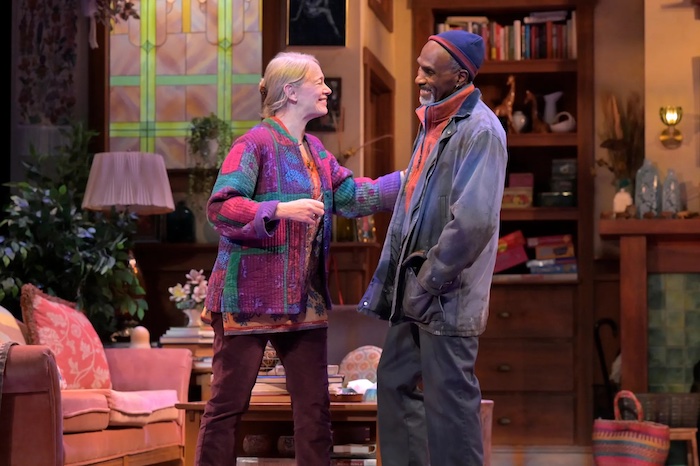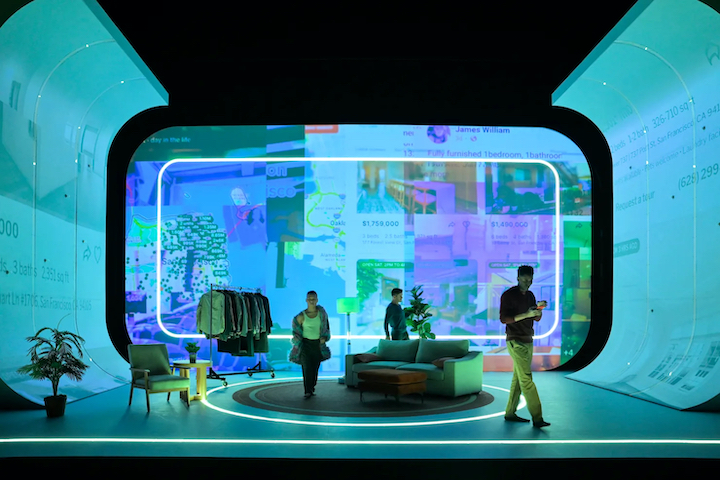
A not-particularly tidy country house is the setting for Act 2 of “Big Data”, the funny, itchy, nerve-jangling new play by Kate Attwell, commissioned by A.C.T. and now on stage in a world premiere production at the company’s Toni Rembe Theater.
Scenic designer Tanya Orellana, working with the keen conceptual guidance of Attwell and director Pam Mackinnon, has created a densely textured sense of domesticity.
There’s comfort in the chockablock detritus of a life well lived by the home’s owners, Didi (Julia McNeal) and Joe (Harold Surratt).
Dogeared photo albums, ceramic knickknacks, a shelf of board games likely unused since their children grew up and moved out; piles of books, a box-crowded attic, colorful woven throws, and cozy worn-in furniture all speak to a satisfying sense of accrual—the accumulation of not mere things, but meaningful experiences.
It’s a striking contrast to Orellana’s Act I set: A sleek space of curved white walls and deceptively pristine surfaces; domesticity through Jonny Ive eyes.
This modern multipurpose environment is alternately used to represent the homes of those grown children, Sam (Gabriel Brown) and Lucy (Rosie Hallett) and their respective husbands, Timmy (Michael Phillis) and Max (Jomar Tagatac).
Well-fleshed emblems of the first fully online American generation (Sam and Timmy are gay; Lucy works in medicine while Max works at home), the two couples may each physically reside in their own apartments, but—per set and script—they live together on the shared plane of the internet, a place that remains all-too neutral, clean and slippery as experience becomes intangible. Memories are vaporized and uploaded into a manipulative algorithm rather than accreting to anchor a persistent sense of self.
The contrasting sets—and the contrasting worldviews of the all-too-human human characters who populate them—are defined with crisp efficiency by both Attwell’s script and MacKinnon’s production.
Star turn, big questions
But “Big Data” was written with bigger goals in mind. In addition to tracing the fault lines of an unnerving existential generation gap, Attwell ambitiously tries to pin down the essence of life lived online.

To do so, she has written M, the play’s non-human character, a personification of the internet or the algorithm, the matrix, the AI, surveillance capitalism, or whatever else one might choose to name the whole ball of pixelated wax we interface with throughout our days. (Attwell’s single initial points to Mephistopheles).
This inherently difficult role is played with dazzling intelligence by BD Wong. In a sinister comic turn, he differentiates M from the other characters not with oracular grandness but the anachronistic rhythms of a fairground sideshow charlatan.
You watch with a combination of glee and unease as he picks the psychological pockets of the mortals around him, transforming all the valuables he retrieves into flattery, seduction, isolation, and dependence.
Not to mention impulsive online shopping.
In Swifty Lazar spectacles and a gloriously cartoonish plaid suit by costume designer Lydia Tanji, Wong delivers an unforgettably vivid performance, so entertaining from moment to moment that you’re able to overlook a significant glitch in Attwell’s broadly inquisitive script.
What M is meant to personify remains a bit fuzzy. Attwell is trying to pin down a cloud.
One watches, rapt, but ultimately realizes that this central character does not act with a clear motivation. Wong keenly etches M’s impish malevolence, but Attwell never really ventures into what’s behind this bad behavior.
The humans M engages with may be turning into puppets, but M is no Gepetto; he’s just a set of high-tech strings.
The real puppet masters and their goals are left offstage, unexamined and unscathed.
